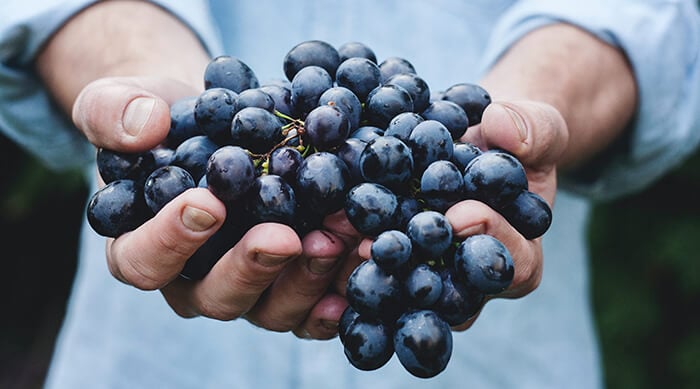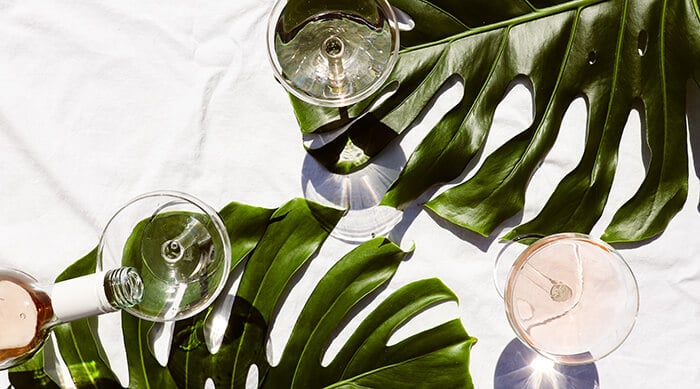Grapes are the key ingredient in both a glass of grape juice and wine. When it comes to the health benefits, though, it may not be clear who would win in the battle of grape juice vs. wine.
In fact, the answer just may surprise you. Read on to learn exactly what the difference is between grape juice and wine, as well as which one is better for you.
What is the difference between grape juice and wine?
The differences may be subtle, but they’re what give one beverage the health edge over the other.
What is the difference between grape juice and wine? The difference between grape juice and wine is how they are produced and the yeast and sugar in each beverage. Wine is allowed to continue fermenting, which results in alcoholic drinks. Grape juice is the result of unfermented grapes and contains much higher levels of sugar.
For the sober curious, non-alcoholic wine is typically made using the same processes as regular wine. In an additional step, the alcohol is removed, leaving behind the benefits and taste of wine without the calories and alcohol content.
Wine is healthier than grape juice. Here’s why.
Grapes offer quite a few health benefits, thanks to their skins. A grape’s skin is packed with vitamins, minerals, and polyphenols that offer some protection against heart disease, low-density lipoprotein (LDL) cholesterol, even cancer.
Red grape skins, in particular, also contain flavonoids and resveratrol, a plant compound that boasts anti-inflammatory and antioxidant properties when you consume it.
It’s found in peanuts, blueberries, dark chocolate, and red wine.
Red wine has the highest amounts of these compounds, as it uses more grape skin in the fermentation process, but these wellness properties are also found in rosé wines.
White wine may have trace amounts depending on how the wine is produced, on top of antioxidant properties unique to white wine. You may have heard of the antioxidant resveratrol and even seen supplements, but the compound can be found naturally in red and rosé wine.
Low to moderate wine consumption has been linked to additional heart benefits. That includes a decreased risk of cardiovascular disease, lowered blood pressure, even a lower risk of blood clots.
More of the grape’s skin is used in the winemaking process than in processing grape juices you’d see on store shelves. This is a key factor in why wine has more beneficial effects than concord grape juice.
Note: Keep in mind that we’re talking about low or moderate alcohol consumption here. The Mayo Clinic notes that for some individuals, no amount of alcohol is suitable. What’s more, any positive benefits decrease the more you consume.
Breaking Down Grape Juice Vs. Wine
Is grape juice healthier than wine? Grape juice isn’t healthier than wine. Red or purple grape juice retains the health benefits of grapes and resveratrol. The amount of sugar in grape juice can be a problem, though, especially for those seeking healthy wine alternatives on a daily basis.
Which has more sugar, grape juice or wine? Grape juice has more sugar than wine, as is the case with many sugary fruit juices. While you can find brands that don’t add sugar to their juice, the amount of naturally occurring sugar in the juice can cause blood sugar spikes all on its own.
Wine has less sugar, fewer carbs, and is lower in calories than grape juice. If you mix the two, you’ll have a tasty version of homemade sangria, but you’ll still be dealing with more sugar than plain wine.
Both juice and wine are processed by the body in a similar amount of time until you add carbonation. Those bubbles boost how quickly whatever you’re consuming is digested.
Generally, wine’s natural fermentation process gives wine an added edge over grape juice.
How Fermentation Works
Fermentation is what turns grape juice into the alcoholic beverage we all know as wine. Yeast turns the sugar in the grapes into ethanol and carbon dioxide. The ethanol stays behind, which accounts for the alcohol content in wine.
For the teetotal folks out there, alcohol-removed wine goes through an additional process where the alcohol is removed post-fermentation.
What about non-alcoholic wine?
As the amount of alcohol consumed increases, the health benefits decrease. However, that doesn’t mean you only have sugary sweet grape juice as an option to get your antioxidant boost.
Non-alcoholic wine retains the flavor and benefits of red wine and white wine without sacrificing nutrients. If you like the idea of using resveratrol to boost your heart health but want to drink less alcohol, try alcohol-removed options.
If you’re looking to lower your sugar intake, whether that’s because you’re looking to lose weight or keep your blood sugar on the level, skip the grape juice.
Red wine is healthier than grape juice. Alcohol-removed wine is even better, with the same fantastic taste.
Want the health benefits of wine without the alcohol? We got you.
Surely’s non-alcoholic wines are produced in the same way a quality wine would be. The added step here is filtering the alcohol out of the wine, leaving behind the good stuff that makes wine a better alternative than grape juice.
Our wines are even safe in pregnancy, as they have the same trace amounts of alcohol as natural fruit juices and kombuchas. Of course, always talk to your doctor about any changes to your diet if you’re expecting.
Taste our crisp sauvignon blanc if you’re a white wine fan or our sparkling rosé if you’re looking for more grape skin and bubbles.
Surely has the health benefits and flavor you’re after without the alcohol. Not sure how to store the wine you didn't finish? Check out our complete guide.
Sources
- Grape phytochemicals and associated health benefits
- Resveratrol, in its natural combination in whole grape, for health promotion and disease management
- The Antioxidant Potential of White Wines Relies on the Chemistry of Sulfur-Containing Compounds: An Optimized DPPH Assay
- Alcohol’s Effects on the Cardiovascular System




